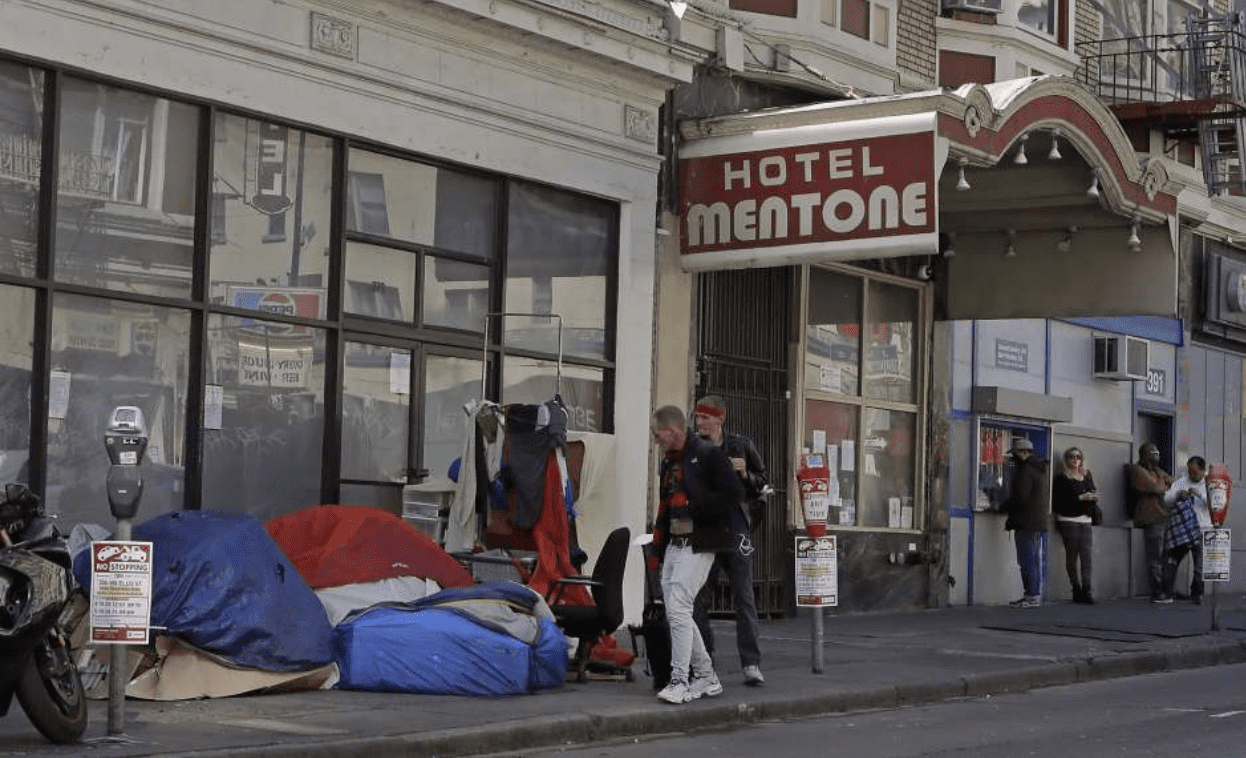Coronavirus: It will take court action to provide relief to Tenderloin

Pedestrians walk to the edge of the sidewalk to avoid stepping on people in tents and sleeping bags on Monday, April 13, 2020, in the Tenderloin area of San Francisco. Local governments have begun moving large numbers of homeless into hotels as part of Operation Roomkey. Among the
requirements are that people get tested when they check in and that medical staff at the hotel make regular checks to see if people’s conditions change. Photo: Ben Margot / Associated Press
This piece originally appeared in the Opinion // Open Forum section of the San Francisco Chronicle on May 5, 2020.
We are suing the city and county of San Francisco. “We” are a nationally known law school, UC Law SF, and a group of residents, service providers and merchants who live and work in the historic Tenderloin — a neighborhood that has been abandoned by our beloved city in this time of crisis.
The city has long used our neighborhood as its containment zone, concentrating on our doorsteps homelessness, illegal drug sales and use, untreated mental illness and crime that no other neighborhood would tolerate. Now, with the pandemic sweeping through, this festering mix threatens suffering and destruction at a previously unseen scale. We have no faith that city government can muster the will to address this desperate situation. We need the federal courts to step in.
The Tenderloin is a working-class neighborhood situated between the Civic Center’s stately buildings, Union Square’s luxury shops, and Nob Hill’s magnificent residences and hotels. Despite its proximity to power and wealth, it has long faced more than its share of challenges.
Yet the Tenderloin has attributes that, if allowed to flourish, would make it great. It has more children per capita than any other neighborhood in San Francisco. Family-owned restaurants abound, with virtually every ethnic community represented. It is diverse in every sense of that word, culturally, racially, ethnically, socio-economically and intellectually. It has museums and schools. It is a place where many first-generation immigrants have begun their American journeys.
It is a place where people deserve to be treated fairly and with respect, just like any other San Francisco neighborhood.
COVID-19 has turned the Tenderloin into a public health nightmare. Social distancing is unknown and sanitary conditions are deplorable. On March 13, before the outbreak, 173 tents crowded businesses and residences; by April 23, this number had doubled. Tents are pitched side by side and crowds of 10, 20 or more hang out on street corners buying and selling drugs and stolen goods. Residents would prefer to walk in the streets, dodging vehicles and stepping over needles and waste, to the alternative of running the gauntlet of the desperate, dispossessed and drug addicted.
Testing is inadequate. Researchers estimate that over 50% of those living on the street are or have been infected with coronavirus. A fire rages and its scope is entirely unknown.
Leaders in the Tenderloin have repeatedly begged City Hall to do something, but the city’s efforts to date have focused almost exclusively on the needs of the unhoused population. A “task force” set up by the city to “assess” the situation did a walkthrough of the Tenderloin on April 28, but concerns expressed about the safety of housed residents — the elderly, the children, the disabled — were largely ignored.
Through its inaction, famously liberal San Francisco tramples the Constitution’s fundamental guarantee of equal justice under the law. The ills that make up daily life in the Tenderloin do not run unchecked in affluent areas of our city. A homeless encampment on the Marina Green would last about five minutes before the police arrived; and a congregation of drug dealers in front of the Fairmont Hotel on Nob Hill would be quickly shown the shortest route to the Tenderloin.
The remedy we seek is a long-term solution to the Tenderloin’s troubles. COVID-19 has simply laid bare what was previously suffered but what is now insufferable. Any long-term solution must be built upon near- and mid-term remedies.
In the near term, the city must (1) begin widespread testing; (2) get the tents off the sidewalks and out of doorways, either by closing the streets to traffic and moving them there, or fulfilling Gov. Gavin Newsom’s order to requisition hotel rooms as a temporary solution; (3) immediately provide washing stations and toilets in the most congested areas; and (4) enforce existing laws.
In the medium term — in weeks, not months — the city must build safe encampments in parks, parking lots and locations that do not impact our poorest and most vulnerable residents. These will provide shelter for an extended period of time for those now living on the streets. Once built, these shelters can provide toilets, showers and health care services, and enforce best practices to avoid further spread of the virus.
This medium-term remedy will provide breathing room for accomplishing the only true long-term remedy: the development of affordable housing. San Francisco’s housing shortage is longstanding and not going away without concerted action. The entire city — not just the residents of the Tenderloin — will need to marshal significant resources and commitment.
The Tenderloin and its people need a non-political solution to achieve equal justice under law. COVID-19 has pushed the Tenderloin over a tipping point, both in terms of the squalor permeating the streets, and the neighborhood’s tolerance of the city’s discriminatory conduct.
This is why we are suing San Francisco.
David L. Faigman is chancellor, dean and John F. Digardi Distinguished Professor of Law at the University of California, Hastings College of the Law.